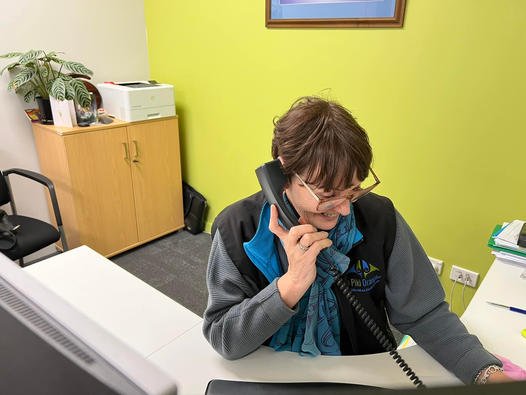Awhi aplenty for flood-affected whanau
Lorraine Staunton, Kaiwhakahaere Ratonga (Service Delivery and Operations Manager) managed Te PIki Oranga’s response during the worst of the severe weather event in Te Tauihu in late August.
Lorraine coordinated the team as they placed 1,336 calls to whānau who were evacuating or potentially affected by flooding.
Anne Hobby, Tumuaki (General Manager) checking in with whānau
The first step was to know who to call, made easier with the support of Te Whatu Ora - Health New Zealand - Nelson Marlborough data analysts who provided maps indicating the location of whānau in flooded areas.
"We were provided with lists so that we could call our whānau who were enrolled or had previously been enrolled,” Lorraine explains. “We had a team working for four days making calls, right through the weekend. We had a team in Wairau, Motueka, and Whakatū. We wanted to provide the lists by region because our people know those areas geography-wise because the questions they might get from whānau would be more common to them.
“Often whānau were being called at the time they were actually packing to evacuate so we talked through their plans and saw if they needed some support that we could offer them. For example, they’d say, ‘we’re going to our mum’s. There’s five of us, our mum’s got a little place and no food.’ We were able to have food ready for them by the time they got to their mum’s. They were just really relieved, it was one thing they didn’t have to worry about.”
Closed roads, increased traffic, and heavy rains meant that many were unable to go to pharmacies for time-sensitive, specialised medications. To combat this, Te Piki Oranga sought emergency authorisation to be able to collect medications on behalf of whānau by working with doctors and pharmacists.
To deliver medication and kai, Te Piki Oranga contacted Civil Defence and provided them with the specific needs of each whānau. If the household was in a closed-off area, kai and medication would be delivered via helicopter. However, having that initial first contact with a familiar organisation meant a lot to those who received the calls.
“A lot of it was reassurance and psycho-social support that we were able to give them over the phone. We made it clear we were coming from a health response, but we were able to connect them to the other support that they may require, like Civil Defence.”
For longer-term, less immediate kai needs, Te Piki Oranga referred whānau to the charitable organisation Te Pātaka, food banks, or other relevant service providers.
In addition to providing immediate support, the calls were a good chance for Te Piki Oranga to connect with whānau who had not been enrolled for a while and had new health needs.
Brenda McQuillan, CAMHS
“Other conversations that came out of the calls were in regards to other health worries they had. They had us on the phone already so they were able to say ‘hey, I’m really worried about my teenager,’ for example, and we were able to refer them to our CAMHS team for follow-up.
“The reconnection was really good. People were grateful for the calls – ‘oh man, you guys are cool, thank you for thinking about us.’”
In addition to directly calling whānau, Te Piki Oranga also kept in touch with the community via their social media channels during the worst of the weather event. Kairukuruku Whakapā (Communications & Telehealth Co-ordinator) Grayson Nepia stayed on through the weekend, pushing out details on hand hygiene, road closures, and boil water advisories. To these messages, Grayson added Te Reo and the friendly tone their audience is familiar with.
Lorraine says that going forward the flood response experience “added to the knowledge for our kaimahi that there will be fallout from the flood response in regards to the continued support that is needed. This morning, I sent an email out to our staff about the pharmacy closures and short staff so that they are aware of the challenges whānau will have. It’s not just the flood, it’s obviously sickness as well that’s caused changes in the community.
“Going forward we’re continuously informing our staff to be able to inform whānau they are working with about any updates or services that could be valuable and needed to provide support.
“I am really proud of our organisation for stepping up and doing what they needed to do at such short notice and between our COVID response and all of the other high-needs things that we do. I’m proud that we were able to respond the way we did. It was a great collaborative approach to supporting whānau in this time of need.”





